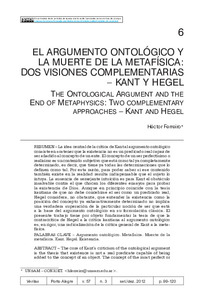Por favor, use este identificador para citar o enlazar este ítem:
https://repositorio.uca.edu.ar/handle/123456789/12410| Título: | El argumento ontológico y la muerte de la metafísica: dos visiones complementarias. Kant y Hegel The ontological argument and the end of metaphysics: two complementary approaches. Kant and Hegel |
Autor: | Ferreiro, Héctor Alberto | Palabras clave: | Kant, Immanuel, 1724-1804; Hegel, Georg Wilhelm Friedrich, 1770-1831; METAFISICA; EXISTENCIA; ONTOLOGIA | Fecha de publicación: | 2012 | Editorial: | Pontificia Universidade Catolica do Rio Grande do Sul | Cita: | Ferreiro, H. A El argumento ontológico y la muerte de la metafísica: dos visiones complementarias. Kant y Hegel [en línea]. Veritas. 2012, 57 (3). Disponible en: https://repositorio.uca.edu.ar/handle/123456789/12410 | Resumen: | Resumen: La idea central de la crítica de Kant al argumento ontológico consiste en sostener que la existencia no es un predicado real capaz de ser añadido al concepto de un ente. El concepto de un ser perfectísimo o realísimo es un contenido subjetivo que está como tal ya completamente determinado, es decir, que tiene ya todas las determinaciones que lo definen como tal. Por esta razón, para poder saber si ese contenido también existe en la realidad resulta indispensable que el sujeto lo intuya. La ausencia de semejante intuición es para Kant el obstáculo insalvable contra el que chocan los diferentes ensayos para probar la existencia de Dios. Aunque en principio coincide con la tesis kantiana de que no debe concebirse el ser como un predicado real, Hegel considera, no obstante, que entender la existencia como la posición del concepto ya exhaustivamente determinado no implica una verdadera superación de la particular noción de ser que está a la base del argumento ontológico en su formulación clásica. El presente trabajo tiene por objeto fundamentar la tesis de que la contracrítica de Hegel a la crítica kantiana al argumento ontológico es, en rigor, una radicalización de la crítica general de Kant a la meta-física Abstract: The core of Kant’s criticism of the ontological argument is the thesis that existence is not a real predicate capable of being added to the concept of an object. The concept of the most perfect or the most real being is a subjective content that is as such completely determined, that is to say, that already has all the determinations that define that concept as such. Therefore, to know if that object also exists in the real world is indispensable that the subject has an intuition of it. The absence of such intuition is, according to Kant, an insuperable obstacle for the different attempts to prove the existence of God. Although Hegel agrees in principle with Kant ́s claim that existence must not be conceived as a real predicate, he considers, however, that to understand it as the position of the already exhaustively determined concept of the object does not imply a true overcoming of the particular notion of existence that is at the base of the ontological argument. In this article I defend the claim that Hegel ́s counter-criticism of Kant ́s criticism of the ontological argument is actually a radicalization of Kant ́s general critique of metaphysics. |
URI: | https://repositorio.uca.edu.ar/handle/123456789/12410 | ISSN: | 0042-3955 | Disciplina: | FILOSOFIA | Derechos: | Acceso abierto | Fuente: | Veritas Vol.57, No. 3, 2012 |
| Aparece en las colecciones: | Artículos |
Ficheros en este ítem:
| Fichero | Descripción | Tamaño | Formato | |
|---|---|---|---|---|
| argumento-ontologico-muerte.pdf | 242,05 kB | Adobe PDF |  Visualizar/Abrir |
Visualizaciones de página(s)
278
comprobado en 27-abr-2024
Descarga(s)
146
comprobado en 27-abr-2024
Google ScholarTM
Ver en Google Scholar
Este ítem está sujeto a una Licencia Creative Commons

